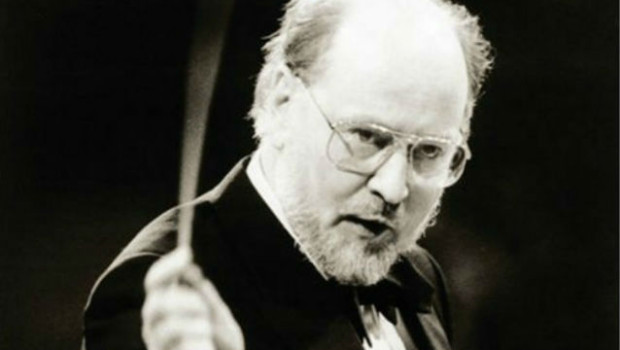Star Wars Original Soundtrack at 40

I was born in 1974, a few years before one of the biggest pop culture events of the last century. Star Wars. The movie and its sequels dominated my childhood and still resonate today. I doubt that I’ll ever stop idolizing Han Solo or loving Princess Leia, but if forced to pick just one thing that defines Star Wars I’d claim the music.
Even if you don’t know Star Wars composer John Williams by name, there’s a good chance you know some of his music. With 50 Academy Award nominations, John Williams is the most Oscar nominated person alive. CNN has a great 2-minute primer on Williams’ prolific career.
Star Wars OST = GOAT
John Williams started composing for films in the late-1950s, paying dues and developing his craft through a large number and variety of movies. In 1975—at the age of 43—he commenced a decade-long tear of film composing that can best be described as shit-hot. His greatest scores from just this period include the original Star Wars trilogy, Jaws, Superman, the first two Indiana Jones films, and E.T., The Extra-Terrestrial.
All of this is to say: the Star Wars original soundtrack was written at the peak of John Williams’ powers. Don’t take it from me though, the American Film Institute named Star Wars as the greatest American film score of all time.
Why the Star Wars soundtrack is so peerless
Stylistic compatibility
Star Wars and its successors provided a perfect vehicle for Williams’ neo-Romantic style (influenced by late-19th century music). This anchors director George Lucas’ out-of-this-world fantasy in a comfortingly familiar, often heroic musical setting. Minnesota Public Radio has an overview of the connections between Star Wars and the compositions that likely inspired Williams, complete with music samples.
Melodies, melodies, melodies
Another reason the Star Wars soundtrack is hailed as a masterpiece: John Williams has an uncommon talent for writing great melodies. During Williams’ career peak, he had such an abundance of melodies that Star Wars and other scores were overflowing with memorable themes. To be fair, many film scores successfully rely on one strong melody apiece, or use other compositional techniques to create atmosphere without distinctive themes. But with Star Wars, Lucas and Williams collaborated so closely that the melodies became an essential, organic component of the drama.
Gave this space opera an operatic injection
Star Wars and the movies that followed—with its massive cast of characters, landscapes, and ideas—was ideally suited for an oversize musical treatment. Williams shrewdly borrowed the technique of leitmotif from 19th century opera, in which a character or other dramatic element is paired with an identifiable melody. This was a groundbreaking decision, one that influenced The Lord of the Rings film composer Howard Shore and others.
Building a galaxy, note by note
Here are just a couple choice cuts from Star Wars—and one from its stupendous musical heir The Empire Strikes Back—with brief descriptions.
Listen to the full YouTube playlist here:
Main Title from Star Wars (A New Hope) (1977)
We hear the main Star Wars theme / Luke Skywalker’s theme for the first time, followed (~1:35) by the Imperial theme, a return (~2:05) of Luke’s theme, then (~3:05) Princess Leia’s theme, and (~3:50) a final statement of Luke’s theme, interrupted again (~4:25) by the Imperial theme.
Williams’ decision to feature just these three themes—representing Luke, Darth Vader (more on this later), and Leia—in the first musical statement of this much larger drama was brilliant and prescient. In retrospect we can see that the SKYWALKER FAMILY is announced as the central figures of Star Wars, and from the outset Luke and Vader spar for our attention.
Imperial Attack from Star Wars (A New Hope)
Attentive fans know that one of the most iconic and recognizable themes from Star Wars—Darth Vader’s theme—wasn’t actually composed and included in the original film. We don’t get to hear Darth Vader’s theme until Empire, which includes the big reveal about Luke and Vader’s relationship and places the villain front-and-center.
The original Star Wars features a more anonymous, still extremely effective, musical theme for the antagonist. Imperial Attack is the fullest statement of this Imperial theme, which is used throughout the original movie and also forms the DNA for the next film’s Darth Vader’s theme.
The Imperial March (Darth Vader’s Theme) from The Empire Strikes Back (1980)
I invite you to play a supremely geeky game with me: which of John Williams’ movie themes is the all-time MVP? You don’t have to be a music expert to play this game, so long as you’ve seen some of the biggest blockbusters of the last 40 years. Is it Jaws, Indiana Jones’ theme, the original Star Wars theme, Superman, Harry Potter? Nope. This is it.
If ever a melody arrived form-fitted to a cinematic character, it is Darth Vader’s theme. In fact, I’d argue this music has more to do with Empire’s cult-favorite status and our decades-long obsession with Darth Vader than the suit, the voice, the asthmatic breathing, or his various feats of bad-assery. It’s impossible to imagine Empire or any of the films that followed without these specific notes rendered with the military precision of John Williams’ score.
The saga continues…Star Wars' musical legacy
One of the most exciting aspects of the Star Wars prequels and the current sequels has been the opportunity to hear John Williams developing upon musical material dating back to the 1977 movie. It’s unprecedented to hear a musical artist—from any genre—building a single body of work over a 40+ year period.
Credit the strength of John Williams’ original score for remaining fresh and relevant, even though it was written a long time ago in a galaxy (being metaphorical here) far, far away…
Image Credit: John Williams Fan Network

 2 min
2 min